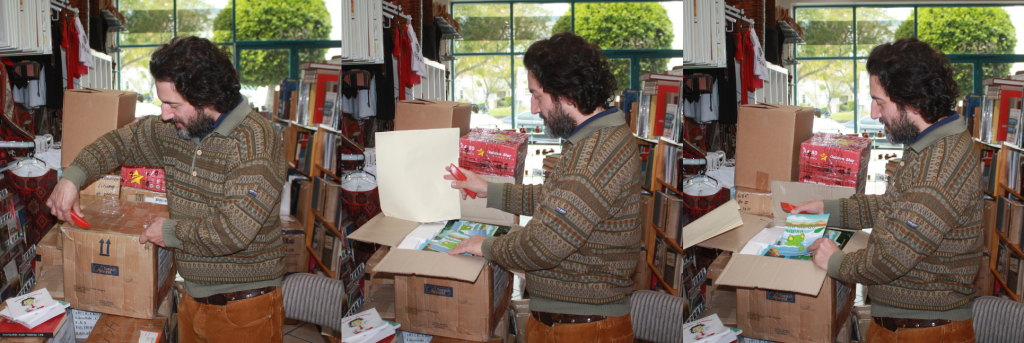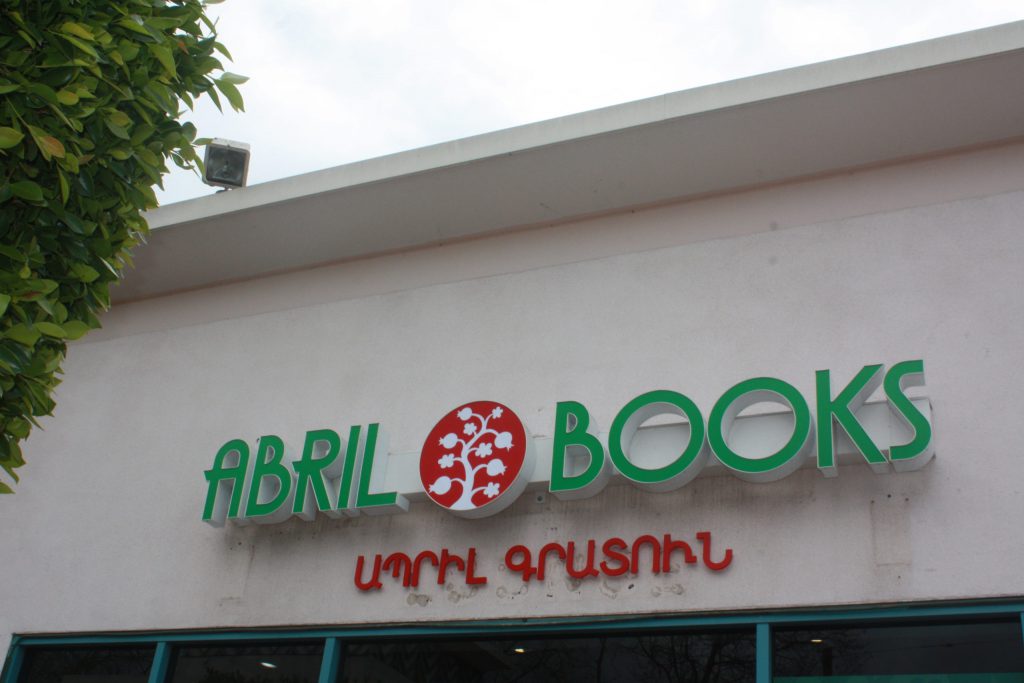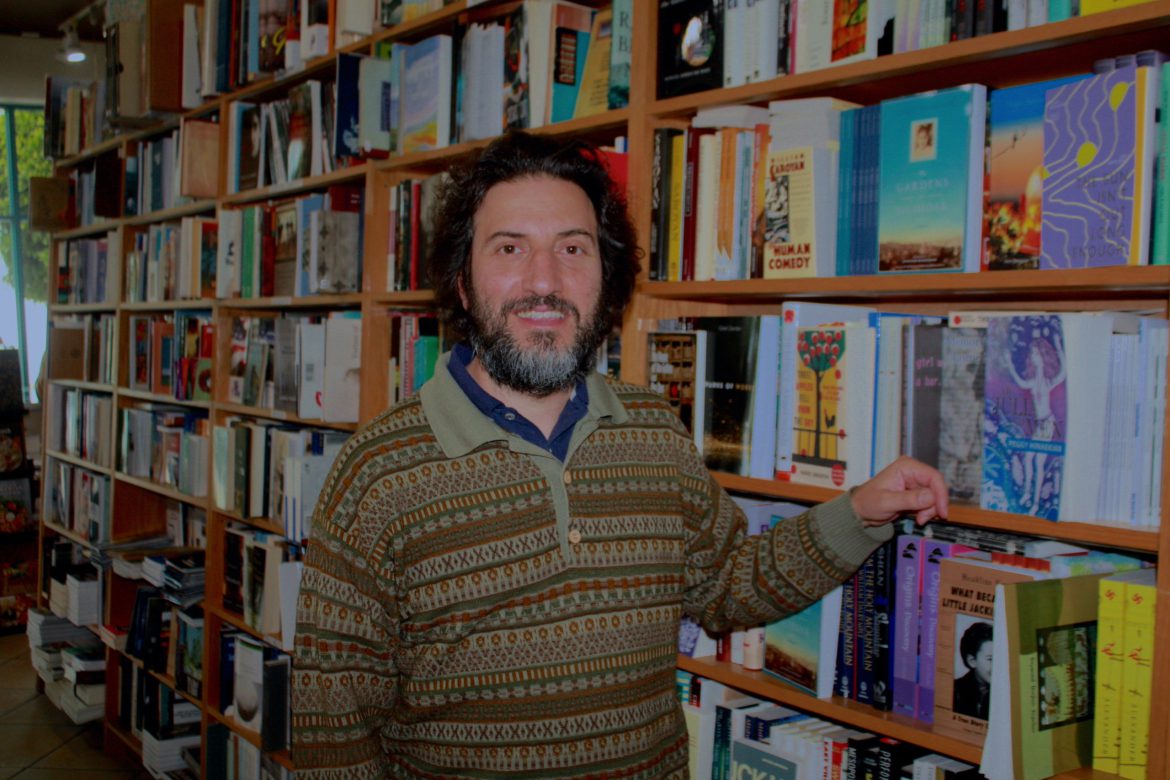MARCH 23, 2022 – By Melody Seraydarian for The Armenian Weekly
There are a few places in the Armenian Diaspora that hold a distinct cultural significance that rival the extraordinary spaces in the motherland itself. One of those places is the reputable Abril Books, which is located in the unofficial Armenian capital of the world, the Jewel City itself, Glendale, California. Over the years, Abril Books, which hosts a double-meaning in Armenian (“to live” and the month of April), has experienced several metamorphic stages to become what it is today: a long-established landmark.
Upon my arrival at Abril Books at its new location on Chevy Chase Drive one afternoon, I was greeted graciously – both by owner Arno Yeretzian and the high-spirited energy of the room itself. There were multiple customers browsing the shelves and thumbing through books and music and occasionally posing questions about the origins of a certain book from the seemingly never-ending options. Seated on a folding chair next to a new order of books that had just arrived from Lebanon, we got to discussing.

“When my father Harout Yeretzian arrived in Hollywood, he began to take up different jobs and then realized there were no bookstores, no magazines, no cultural centers. There was nothing, really,” recalls Yeretzian of the literary void in the Armenian Diaspora of southern California. A former editor and print technician, Harout Yeretzian decided to launch the first Armenian language magazine in Los Angeles—Abril Magazine.
“At first, it was released every month,” explained Yeretzian. “My father was the editor. He saw the vibrant community here – authors, artists, businesses – and teamed up with my uncle, Noubar Yeretzian, who was very social. He actually began to collect all the advertisements for the magazine, and my dad wrote all the articles and interviewed everyone.”
Soon after the birth of the magazine in 1977, Abril Printing was established. Once the brothers acquired a printing press to print their own magazine, they began to receive all sorts of requests to print letterheads, business cards and fliers. They also realized a large number of authors in the area who were ready to publish their books. That’s when Abril Publishing started. Then they noticed a need for a setting to purchase these Armenian books, and so…you know how the story goes.
“The year after Abril Publishing started, the space next door opened up. They decided to buy that place and create an Armenian bookstore. And finally…,” chuckles Yeretzian, “Abril Books started in 1978.”
It was a family affair. His mother, notable artist Seeroon Yeretzian, and his aunt Seta Yeretzian, would do all the typesetting and work in the darkrooms. Yeretzian spent his childhood playing in the store with his cousins. Abril Books was more than a bookstore. It became an extemporaneous community center.
“It was almost like coming back to Armenia. Everyone was attracted to it. Intellectuals, doctors, lawyers…everyone who wanted books was coming to Abril.” He pauses and begins to paint a picture of a still frame of the store. “Books from Armenia, Lebanon, from anywhere in the Diaspora were scattered everywhere. Everyone was smoking cigarettes. The scents of coffee, food. People from different backgrounds like Tashnags, Ramgavars, communists, different churches…all under one roof. What came of it were interesting conversations, arguments, laughter and fights. That’s where we grew up.”
The rise of the bookstore meant the voluntary fall of the magazine. As the patriarch Harout Yeretzian brought in famed figures in the Armenian community to the bookstore such as Hamo Sahyan, Silva Kaputikyan, Sero Khanzadyan and Vahe Oshagan, more and more events began to be hosted in the space, debossing the bookstore’s popularity within the people. In the midst of this, however, tragedy struck. Noubar Yeretzian passed away in the late-1980s from amyotrophic lateral sclerosis (ALS), shocking all involved in the Abril community to their core. However, in true Abril fashion and in Noubar’s honor, the work had to continue.
As the Armenian community in Glendale became more and more prominent, Harout Yeretzian made the executive decision to follow suit, opening up shop on Broadway, a bustling street in Glendale. At this point, Yeretzian was in college, studying film and video at the University of California, Santa Cruz, but he was still lending a helping hand at the bookstore. Upon his graduation, he began to work there full-time, handling customer service, the website and orders.

“[Abril Books] became like a tourist place for Armenians from all over the world. Even to this day, people come and take pictures in front of the sign.” He laughs knowingly for a moment. “There really is no place like it. The collection of books ranges from Armenia, Lebanon, Syria, Greece, Canada…all the United States publishers. It really is a unique collection.”
Book events became common, and it adopted the same “homey” mindset as the Hollywood location. Yeretzian would even host culture nights that were a hit with the community. Woefully, in 2010, Harout Yeretzian unexpectedly passed away from cancer. Another huge shock, the bookstore was now promptly placed onto Yeretzian’s shoulders. But part of the beauty of the Armenian community is our unconditional willingness to help a friend in need.
“All my father’s friends helped me. All the other bookstores in the community helped me. Any questions I had, they answered.”
With the thought of closing the bookstore weighing on Yeretzian, he continues on to say, “In spite of everything, how can you close a store called ‘Abril’?”
To say the community is glad that Abril stayed alive is an understatement. If anything, it flourished. Yeretzian started a new lease with the space next door and connected the two units, opening the door to new events that attracted Armenians and non-Armenians alike.
“Then, COVID happened. Right when we were peaking in a way, too,” says Yeretzan. “We just had a food event with Richard Hagopian. Bei Ru was doing evenings at Abril. My friend Harout was sharing his old 78 RPM records. Everybody was coming, both young and old from all different organizations and beliefs. That’s what I liked the most. It was a place where everyone mixed…the transition from the old to the new. We had events in both dialects and English. So because of COVID, the decision I made was to move it to a new space in Glendale.”
The pandemic became another challenge that loomed over not only Abril, but bookstores everywhere. It underscored the increasingly ever-present issue of a digital world and what that could mean for booksellers.
“It’s a huge reality we need to deal with. In the old store, there was a thirst for Armenian books because the Armenians in the area had just come from Armenia, from Lebanon, from Syria, from Iran…The children of those immigrants grew up, and so our English collection got larger, as that is what they were looking for,” states Yeretzian.
Playing a quintessential role in Armenian culture and allowing us to celebrate our shared human experience, bookstores like Abril allow us to relish in the diversity and richness of our literary works. If you ever find yourself in Glendale, stop by and browse the vast selection available at your fingertips.
Tinged with hope, Yeretzian concludes, “After the Artsakh War, there was a whole reawakening of appreciation for Armenian culture in general. I know the reality is that books may very well become for collectors. However, there are still people who understand the different experiences of holding a book, reading a book.”
Those people will find a home at Abril. Quite frankly, any Armenian will.
Melody Seraydarian
Melody Seraydarian is a writer from Los Angeles, California. She is an active member of the AYF Hollywood “Musa Ler” Chapter. Melody also interns for the Armenian Bar Association and volunteers for various political causes and campaigns, while working on other writing and design projects.




